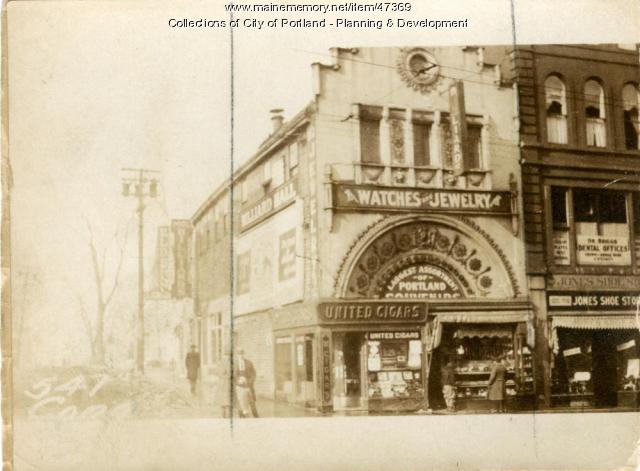Keywords: Congress
Item 104406
Congress Street, Portland, 1921
Contributed by: Maine Historical Society/MaineToday Media Date: 1921 Location: Portland Media: Glass Negative
Item 75599
Congress Street at Forest Avenue, Portland, ca. 1933
Contributed by: Maine Historical Society Date: circa 1933 Location: Portland Media: Postcard
Item 38961
589 Congress Street, Portland, 1924
Owner in 1924: Devisees of George C. Shaw Co. Use: Store & Bakery
Item 38984
626-632 Congress Street, Portland, 1924
Owner in 1924: Consolidated Industries, Inc. Use: Stores
Item 110023
J.P. Baxter Block, Congress Building, Portland, 1908
Contributed by: Maine Historical Society Date: 1908 Location: Portland; Portland Client: James P. Baxter Architect: Frederick A. Tompson
Item 110019
Masonic Building Cor. Congress & Chestnut Sts., Portland, 1909
Contributed by: Maine Historical Society Date: 1909 Location: Portland; Portland Client: unknown Architect: Frederick A. Tompson
Exhibit
John Hancock's Relation to Maine
The president of the Continental Congress and the Declaration's most notable signatory, John Hancock, has ties to Maine through politics, and commercial businesses, substantial property, vacations, and family.
Exhibit
MHS in Pictures: exploring our first 200 years
Two years after separating from Massachusetts, Maine leaders—many who were part of the push for statehood—also separated from Massachusetts Historical Society, creating the Maine Historical Society in 1822. The legislation signed on February 5, 1822 positioned MHS as the third-oldest state dedicated historical organization in the nation. The exhibition features MHS's five locations over the institution's two centuries, alongside images of leaders who have steered the organization through pivotal times.
Site Page
Maine's Road to Statehood - The Coasting Law of 1789
"The law, passed by the United States Congress, forced ships along the coast to port and register at each state with which it did not share a boarder."
Site Page
Maine's Road to Statehood - The Final Vote
"… Crawford, passed a revised Coasting Law through Congress, which turned the entire eastern seaboard into one district and thus avoided the economic…"
Story
Ted Truman (Throumoulos): A treasure trove of stories
by Biddeford Cultural & Heritage Center
A son of Greek immigrants’ insight into his entrepreneurial family, culture and life experiences
Story
What did I do during the Covid quarantine?
by Nasser Rohani from Baha'i Community
Individuals response to Covid and social distancing.
Lesson Plan
Maine Statehood and the Missouri Compromise
Grade Level: 9-12
Content Area: Social Studies
Using primary sources, students will explore the arguments for and against Maine statehood and the Missouri Compromise, and the far-reaching implications of Maine statehood and the Missouri Compromise such as the preservation and spread of slavery in the United States. Students will gather evidence and arguments to debate the statement: The Missouri Compromise was deeply flawed and ultimately did more harm to the Union than good.
Lesson Plan
Grade Level: 9-12
Content Area: Social Studies
Maine's quest for statehood began in the years immediately following the American Revolution. Though the state of Massachusetts consented to the separation in 1819 and Maine would ultimately achieve statehood in 1820, Maine’s split from Massachusetts was not without controversy and was not universally supported by people living in Maine. Using primary sources, students will explore the arguments for and against Maine statehood. Students will gather evidence and arguments to debate the statement: It is in the best interests of the people of Maine for Maine to become its own state.






















